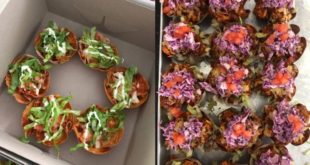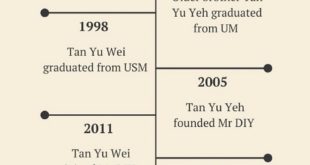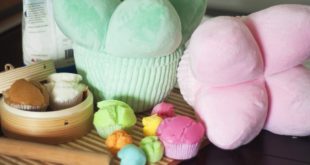Eating traditional kueh is something most people have fondly enjoyed with their parents or grandparents.
But for 55-year-old Sandy Tan and her daughter, 31-year-old Elizabeth Chan, they may even say it was the glue that brought them together.
The two ladies are the co-founders of Kueh Ho Jiak, which has found its claim to fame by putting a fresh spin on old-school confectioneries.
They are best known for their signature colourful ang ku kueh, made in a variety of fun shapes like flowers, fish, hearts and even cartoon characters.

Starting out as a home business back in 2011, their motivation was to make kueh appealing to children so that its culture will not fade away.
Four Generations Of Kueh Makers
The art of making nonya kueh has been in their family for four generations, tracing back to the days when Sandy grew up in a kampung.
She describes her childhood to be fun and full of adventures, as she and her 10 siblings would cycle, catch guppies, and watch aeroplanes near their home take off.
Sandy’s grandmother sold kueh from a food cart in the 1930s, then passed it down to Sandy’s mother.
Sandy started out helping her mother with sundry tasks like collecting dishes, and later learned how to make a few types of kueh when she was 13.

“Sometimes, I sneakily made some ondeh ondeh for sale [besides the kueh I made for my mum], so that I could earn more pocket money,” she reminisces.
Even though decades had passed when she decided to revive her family’s trade, Sandy was still a natural at picking up the recipes again from the internet.
On the other hand, Elizabeth admits that learning how to make kueh from scratch was quite challenging for her.
“The hours are very long and it can be very tedious. [You also have to] keep stirring the dough nonstop so that it won’t get burnt,” she shares.
As she practiced under her mum’s guidance, becoming the fourth generation of kueh makers in her family, one thing Elizabeth learned was that kueh are “very sensitive”.
“A lot of patience and effort is needed. If they are not prepared well with love, they will spoil very easily.”

A Family Reunion Turned Into A Family Business
Sandy and Elizabeth credit Kueh Ho Jiak for bringing them closer and helping them appreciate each other more.
However, it wasn’t easy for them to build the strong relationship they have now.
In an interview with The Royal Singapore, Elizabeth shared that her father was killed during a business trip in China when she was only one-year-old.
Suddenly having to grapple with this tragedy and her new life as a single mum, Sandy left to work in a casino in Australia to provide for her daughter.

Thankfully, Elizabeth’s grandmother was able to help take care of her. But not having both of her parents around gave her a troubled childhood, and led her to become rebellious in her teens.
She dropped out of school at 14, but still managed to complete her ‘N’ and ‘O’ Levels privately after she found the motivation to continue studying at 17.
It was only when Elizabeth had a baby a few years later that Sandy quit her job and returned to Singapore.
[My mum told me] she felt guilty that she wasn’t by my side throughout my childhood. So she wanted to come back to take care of my daughter and give her our best.Elizabeth Chan, co-founder of Kueh Ho Jiak
The family was finally reunited, and Sandy fully dedicated herself to looking after her granddaughter.

Eventually, when her granddaughter started attending preschool, she poured that free time into making kueh.
“Mum fell in love with making kueh again. Each time she gave some to our family and friends, they would order more to gift to others, and then the recipients would start to order from her too,” Elizabeth says.
Being “an outspoken and outgoing lady”, Sandy didn’t just stop at mastering the traditional recipe — she dreamed of creating her own version of colourful yet healthy ang ku kueh.

To do this, she ditched the usual glutinous rice skin and experimented with using sweet potatoes to make her own dough.
It was no simple feat, as sweet potatoes spoil easily in Singapore’s hot climate.
“I still remember how much dough and kueh she has thrown away over the years to gain the standard we have today. It feels like an infinite amount!” Elizabeth laughs.
Making Kueh Is A Round-The-Clock Job
Initially, Elizabeth helped to do Sandy’s kueh deliveries while she ran her own curtain business.
Juggling both was manageable at first, but as Kueh Ho Jiak’s orders grew, she realised it would soon require her full commitment.
Giving up her own business was a tough decision, as it had been doing well for years. The income she earned from it was comfortable enough that Sandy didn’t need to work and could even afford to travel.
“I was always asking myself if I was prepared to have a change of lifestyle and working environment. As I have a daughter now, the sudden decrease of income and the uncertainty was something that held me back.”
It wasn’t easy — I took over a year to contemplate before I decided to take the courage to choose one of the two. Ultimately, I felt that Kueh Ho Jiak was the greater purpose in my life.
Elizabeth Chan, co-founder of Kueh Ho Jiak
Ever since she took the plunge, her days have been packed from morning to night, but Elizabeth believes the sacrifice is worth it.
She starts the day by sending her daughter to school and getting some exercise. Then she takes care of marketing, accounts, and meetings through the morning.

“At noon my mum and I will start cooking the ingredients from scratch, and in the evening we will mould the kueh, usually until 11pm.”
When it was just the two of them, Sandy and Elizabeth could only afford two hours of shut-eye before they got back to the grind.
They had to start steaming all of the kueh at 1am, in order to bring them to their stall at 6am before opening time.
Kueh Ho Jiak opens their stall from 7.30am to 2pm, but their shelves are sometimes emptied by noon.
In the last few years, they’ve increased their manpower so that they can save more time for rest.
Learning From A Costly Mistake
After running Kueh Ho Jiak from home for some time, they decided to try bringing their creations to a physical shop.
They moved into Ci Yuan Hawker Centre in Hougang in 2015. However, it didn’t last long as the price of rent “almost doubled” after their first year.
They had better luck when they took their second shot in 2017, opening a stall in Tanjong Pagar Plaza Food Centre that remains strong till today.

Along the way, they also had to learn a costly lesson when they attempted to expand down a different route.
In 2019, they opened a café outlet at East Village in Bedok. But this turned out to be “a mistake”, according to Elizabeth.
Even though it received a crowd on weekends, customers that walked through their doors on weekdays were “very scattered”.
Eventually, they felt that they could no longer justify bearing the rental costs for just two good days of business each week.
The failed venture cost them “6-digit figures”, but Elizabeth considers it as part of the experience.
I guess that’s the life of an entrepreneur. However, if you love what you’re doing and have a passion for it, you would definitely find a way to break through.
Elizabeth Chan, co-founder of Kueh Ho Jiak
For them, the breakthrough was understanding their audience better, and scaling back to focus on things that worked.

While serving kueh in a café setting didn’t fly, they had a strong base of regular fans online and at their hawker stall.
On top of that, they also received a healthy demand for hands-on experiences when they organise kueh-making workshops.
40 To 50 Per Cent More Online Orders During ‘Circuit Breaker’
Despite a few bumps in the road, Kueh Ho Jiak gained plenty of recognition that affirmed their relentless efforts.
One of the most notable achievements was being chosen to serve their kueh for President Halimah Yacob at the Istana.

But no matter how far they’ve gone, the smallest displays of appreciation still mean the world to Sandy and Elizabeth.
“Seeing the smiles on customers’ faces after they eat our kueh always makes us feel very loved.”
Even after the COVID-19 outbreak hit, customers continued to pour out their support online.
While most F&B businesses have struggled during the ‘circuit breaker’ period, Kueh Ho Jiak surprisingly saw sales increase by “40 to 50 per cent”.

Customers have especially been keen to send boxes of kueh to their parents while they are unable to visit during this time.
“Every time I type out their personalised messages, I feel so touched by what they’ve written — asking their parents to be good, stay home, and so on,” Elizabeth says.
“She Never Gives Up No Matter How Tough Life Was”
After everything they’ve been through in the past, being able to start a business with her mother has been truly special to Elizabeth.
“The more we worked together, the more strengths we started seeing in each other, and the more we started to understand each other.”
“It’s like each day I am finding and piecing up missing jigsaws from my childhood [when she wasn’t with me],” she says.

Of course, always being in harmony both at work and at home is “easier said than done”. However, they’ve learned that the most important thing is being able to compromise and take a step back when opinions differ.
Throughout the journey of Kueh Ho Jiak, Elizabeth has constantly been inspired by Sandy’s passion and determination.
She never gives up no matter how tough life was. She persevered in everything she did.
Despite the fact that my dad passed on when I was very young, she didn’t give up on life, she was very positive, she worked very hard for the family.
Even when she started making kueh, she failed umpteen times, but she [never stopped developing them] to achieve the taste we have today.
Elizabeth Chan, co-founder of Kueh Ho Jiak
The mother-and-daughter duo have been told that they were “crazy” to put in so much effort when they are only selling kueh in a hawker centre, not a hotel.
“But it has never stopped us from creating something different, because we take pride in what we do,” Elizabeth says.
To get a taste of their labour of love, visit Kueh Ho Jiak here.
Featured Image Credit: Kueh Ho Jiak



